This passage from Drew McWeeny‘s Lady in the Water AICN review got me: M. Night Shyamalan “seems to have cast himself as the Writing Messiah, a man whose words are so powerful that they will alter the very fabric of our reality. The character idea alone would be a little nauseating, but for Night to step in and play his biggest role in any film except his largely-unseen first film…and to have it be this particular role… this is what I mean when I say he invites the comments on his ego now. This would be like George Lucas insisting on playing The Emperor or Alfred Hitchcock playing Norman Bates. It’s so lunkheaded you can’t look away. God help me, I√ɬ¢√¢‚Äö¬¨√¢‚Äû¬¢m not exaggerating.” Read the whole review. It’s a mean one, but it has a thorough and perceptive examination of Night’s egoistic artist psychology.
San Diego Hoo-Hah
San Diego Hoo-Hah
I was so backlogged by Friday midnight that I decided not to return to Comic-Con today (i.e., Saturday, 7.22). No offense but I was fairly okay with that. I heard a little voice late last night that said “fug it.” It’s a cool thing to be a Comic-Conner but after wandering around the San Diego Convention Center and sitting for several hours inside the cavernous Hall H, you start to feel like a stooge sitting there with 5000 others, watching show after show on the big screens and absorbing the big-studio sell-jobs.
In any case Friday’s action — a special screening of Darren Aronofsky’s The Fountain, the raucous Snakes on a Plane presentation, the colleague buzz that followed the promo for Alfonso Cuaron’s Children of Men — was enough to fill the tank.
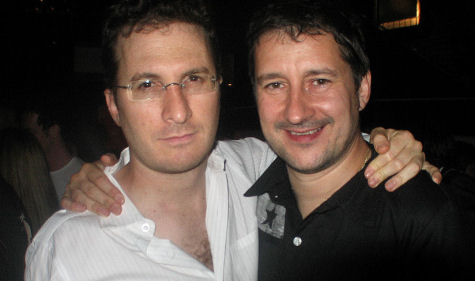
Fountain director Darren Aronofsky (l.), composer Clint Mansell (r.) at small party following Friday night’s Fountain screening
The Snakes presentation was a lot of fun for everyone, but for me it was also a bit of a downer — a final official confirmation that Snakes on a Plane isn’t going to be anything like Tremors (i.e., a smart, crafty comic thriller), and possibly more like a cheeseball B-movie with special effects out of the mid ’90s, and enhanced by the reverse Midas touch of a go-along, second-tier director.
Aronofsky’s The Fountain (Warner Bros., 10.13), which I saw with about 20 other journalists last night in a plex on 5th Street, is the most beautiful and best-cafted cosmic head-trip movie since I don’t know what. 2001: A Space Odyssey? Fight Club? The first half of Altered States ? (I was never a big fan of Bertolucci’s Little Buddha. Was anyone?)
< ?php include ('/home/hollyw9/public_html/wired'); ?>
And for a movie with Hugh Jackman and Rachel Weisz playing three characters each in three different eras (the 1500s, the present and the 24th Century), it’s remarkably easy to sort through and make sense of. You have to let it seep into you like any great book or perfectly brewed cup of tea, and you have to seep yourself into it also, but it’s an extraordinary place to go to and then return from….like a planet unto itself.
It’s one of those films that takes a little seasoning to appreciate. Mature educated types will like it more than typical 20-something hormonals, women probably more than guys who watch football and smoke cigars and drive SUVs, etc.
I’m presuming that anyone who’s ever tripped on anything will definitely respond to The Fountain. (Most columnist-critics are afraid to admit they’re “experienced”, but a lot of people of character and conviction dropped in the old days). This means, I guess, that at least part of the marketing effort will have to be directed at boomers who’ve been around that particular block.
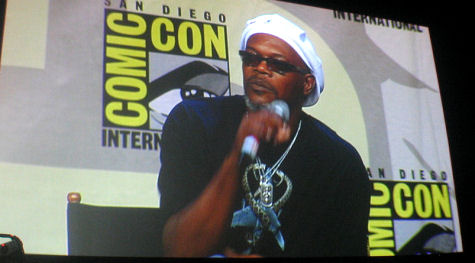
Samuel L. Jackson during yesterday’s Snakes on a Plane presentation at Hall H
But a good nutritious film is a good nutritious film, and The Fountain is tight and rich and well-crafted enough that it will play just as well ten or fifty years from now.
I guess you could call it an odyssey. It’s about parallels, echoes and refrains between Jackman and Weisz’s three characters over a thousand-year time-span. The three settings are 16th century Spain, here-and-now America and somewhere in the nether cosmic regions some 500 years from now. It’s a movie about healing, loving…trying to break through.
The Fountain will play at both the Venice and Toronto Film Festivals in early September. I’ll get into it more sometime around then.
I don’t know where I was when the presentation for Children of Men (Universal, 9.26) happened, but one look at the trailer tells you it’s a gripping futuristic thriller and a class act that steers clear of generic Comic-Con elements — i.e., mythical terrain, geek wonder, visually driven, monsters and mutants, etc.
On top of which it’s got Cuaron (Y Tu Mama Tambien, Harry Potter and the Prisoner of Azkaban) co-writing a script with Timothy Sexton (Live from Baghdad) and with Clive Owen, Julianna Moore and a hippie-haired, pot-smoking Michael Caine costarring. You can feel the focus and and smell the pedigree.

Clive Owen, Julianne Moore in Children of Men
Set in Britain a few decades hence, it’s about mankind facing extinction and anarchy because of an infertility defect that has spread across the globe. Cuaron was quoted as calling it “the anti-Blade Runner.” I’m guessing that Children will be shown at the Toronto Film Festival and that screenings starting next month in Los Angeles are also likely. The great Guillermo Del Toro (Pan’s Labyrinth) Interviewed Cuaron during the presentation.
I don’t know how I managed to avoid thinking about Child of Men until yesterday, but I’m all over it now.
The Warner Bros. presentation include a briefing onThe Reaping, which looks like The Birds by way of The Swarm except it’s about locusts and (I presume) frogs and other Biblical plagues visited upon a small southern town. The director is Stephen Hopkins, a moderately talented, very friendly Britisher (The Life and Death of Peter Sellers) whose involvement in a film of this sort means….competency.
Problem is, I’m having trouble remembering the title. The Reaping, The Gleaming, The Shining, The Reaming, The House-Cleaning…hard to hang onto.
Next on the bill was Superman Returns director Bryan Singer, who told the crowd he intends to shoot a Supie sequel for 2009, and that he hopes to “go all Wrath of Khan on it.” After a while Singer brought on Richard Donner, director of the original ’78 Superman with Chris Reeve. Donner was there to plug a new Superman II DVD. He showed a cool Superman-deceives-Lois scene from that film that was never used in the film. The disc will also include footage of Reeve doing screen tests.
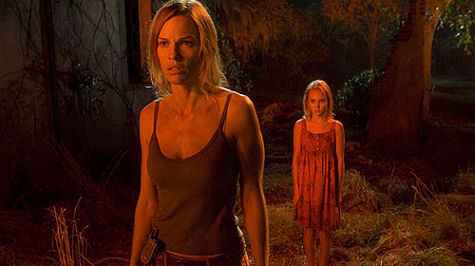
Hilary Swank, AnnaSophia Robb in The Reaping
The best thing shown the whole day was Singer’s Superman Returns blooper reel. It’s hilarious. He only cut it together a day earlier, I was told. Singer should definitely put this on the DVD.
The second funniest thing happened when Singer was asked about the selling if Superman Returns. “I can’t talk about the marketing,” he almost whispered…but it was clear he wasn’t delighted with what happened. His hints, implications and half-utterances on this subject were priceless.
I can’t talk about 20th Century Fox’s Eragon because it struck me as another mythical CG battle flick in the crusty mold of Joseph Campbell, Lord of the Rings, Dragonslayer and Star Wars. Same deal with Pathfinder. Reno 911….low-rent but a lot of people will have fun with it. Borat ….same.
A unseen sequence from Peter Jackson’s King Kong Deluxe Extended DVD was shown on the big screens. It’s a re-do of the scene from the ’33 original with crew making their way across a swamp on a raft. It was “fun” to watch and yet it was typical Jackson crap — vigorous and inventive, overwrought, show-offy. The guys are attacked by a huge eel-like monster with big yellow teeth, and Jackson has his creature swim all kinds of wow stunts like he’s a dolphin at Sea World.
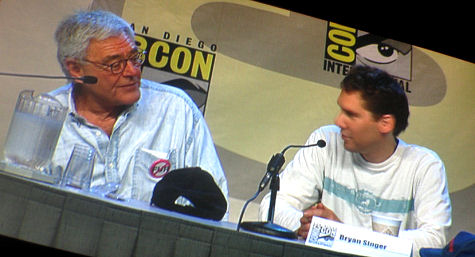
Richard Donner, Bryan Singer
Neil Labute talked about The Wicker Man (Warner Bros., 9.1) a bit, and then showed a scene from the opening of the film. Nic Cage is a motorcycle cop pulling over a young mother because her daughter has thrown a doll out in the road. The scene starts to get creepy, and then creeper still…and then shocking, and then demonic. It left me with a feeling that The Wicker Man is going to be a very scary film. Labute is one of the brightest directors around, but I wouldn’t call him warm and fuzzy. And you need a little touch of steel in your soul, I think, to push the right buttons and do the job on people.
Comic-Con is the ultimate cinegeek get-together. I love being surrounded by thousands and thousands of mellow eccentrics. Spiritually-speaking, the vibe is very cool…serene, even. But nobody looks like they work out much or eat a lot of healthy food. There were always a good amount of smokers outside. Four or five people suggested to me that Comic-Con was about movies and mythology but also drinking. Lots of that.
San Diego’s Gaslamp district has the usual-usual tourist stuff (cool restaurants, lotsa bars, pretty women), but I wish have liked to visit here during Wyatt Earp’s day. Which was one reason it feels better to just chill and work on the column today in air-conditioned comfort. I’m sitting in a guest cabin this afternoon in Escondido (about 30 miles north of San Diego), and it’s the Nefud desert out there.
“Vice” blurbs
There’s a big Miami Vice ad in Sunday’s N.Y. Times focusing mainly on David Poland ‘s MCN review, calling it “a summer movie that a lot of people have been waiting for, something for the adults to see, something that demands that you pay attention…with lots of guns and drugs…a movie that, by the third act, makes you feel like you are in the experience and not watching the experience.”
Good deal and nice going, but I have two and a half observations. One, not to slight Poland but the fact that Universal is using an MCN quote rather than, say, a quote from one of the big super-venerated print critics tells us that Universal couldn’t find a big super-venerated print critic who’s over-the-moon nutso about Vice (the big distribs always spotlight high-toned, old-pro print quotes in their lead-off ads). Two, print is receding and online is gaining — would Universal have used an online guy for their lead-off quote ad for a major film, say, five years ago? And three (i.e., the halfer), my judgments, although not quite constituting a 100% total-somersault rave, have more verve and pizazz than Poland’s jottings.
I called Michael Mann’s film “my kind of two-hour popcorn movie…an exquisitely configured, not-too-taxing thing for people who are smarter, hipper and more seasoned than the mainstream squealies who went nuts for Pirates 2.” I also said that “the fumes of Miami Vice — the aroma, the grit, the atmospheric stuff, the digital flavor of Dion Beebe’s here-and-there photography — are superb (and sometimes in a realm so special I can’t quite describe it), and this alone makes it the supreme commercial ‘ride’ movie of the summer,” and that it’s “a crime movie that roars in and does the job, but lingers on with so many different little moods and tones and accents and side-excursions that, like all first-rate films, it’s clearly up to a lot more than just ‘story’.” See what I mean? I know that I sound like a puffed-up egoistic asshole, but the writing’s more savory.
Weekend box-office
Friday’s earnings and projections: Pirates 2 beat ’em all again, pulling down $10,084,000 Friday and a projected weekend take north of $30 million. (What is that, a grand total of $320 million?) Monster House is #2 with $7,470,000 million earned Friday and $22,268,000 expected by Sunday night for a grand tally of $320 million or thereabouts. Lady in the Water managed a #3 slot despited the media buzz — $6,713,000 yesterday and $18,436,000 projected for the weekend. You, Me and Dupree was #4 with $3,965,000 Friday and a bit more than $13 million predicted for the weekend. Little Man did $3,210,000 Friday with a projected $10,427,000 by Sunday night. Kevin Smith’s Clerks 2 was sixth with a disappointing $3,097,000 on 21590 screens, and a projected weekend total of $10,100,000. My Super Ex-Girlfriend tanked with a seventh-place finish — $2,698,000 Friday, $7,300,000 predicted for Sunday night. Superman Returns is finished — earning a lousy $1,964,000 on Friday with a weekend total of about $7,102,000 expected. The Devil Wears Prada, a much smaller film aimed mainly at women, took in $2,181,000 Friday and will be at the $97 million mark by Sunday night — it’ll definitely top $100 million.
Comic-Con Rap
“I’ve been attending Comic-Con for at least ten years now (being a local allows this on a threadbare budget) and this is the first time in a lonnng time that the vibe’s been different,” writes Joe Maniquis of San Diego. “I can’t quite pin it down and I don’t have numbers to back it up but the crowds seem lighter, the exhibit hall less frenzied and there seems to be no big-time buzz about anything, and everybody’s presence there felt perfunctory. It got so bad that we ended up skipping out on Sam Jackson and his Snakes show and getting sloshed early at The Field. I’m wondering I’m alone in this or if you or others are having the same thoughts about the whole thing.” Comic Con sure as hell seemed crowded to me yesterday, but if anyone has any reactions…
“Snakes” & Such
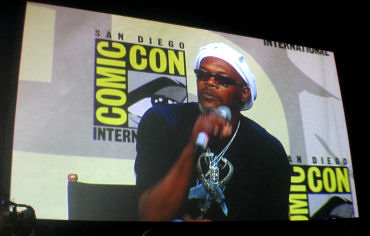
Samuel L. Jackson having the time of his life during yesterday’s Snakes on a Plane presentation in Hall H at Comic-Con, about five minutes before an Animal Planet fan asked if Jackson thinks that the snakes in the film really deserved to die, to which Jackson replied, “Hell, yeah, they deserve to die!…and I hope they burn in hell!” — 7.21.06, 6:40 pm.
(a) Big Comic-Con crowd exiting San Diego Convention Center following end-of-the-day Snakes on a Plane presentation — Friday, 7.21.06, 7:10 pm; (b) Edward Speleers , 18 year-old star of 20th Century Fox’s Eragon (12.15), answering questions during 20th Century Fox’s Comic-Con presentation early Friday afternoon — 7.21.06, 2:20 pm; (c) The Fountain director-writer Darren Aronofsky (l.) and the film’s composer Clint Mansell (r.) at small party following Fountain screening at Pacific plex on San Diego’s Fifth Street — Friday, 7.21.06, 11:05 pm; (d) Two Superman directors — Richard Donner and Bryan Singer — during Warner Bros. ComicCon presentation — Friday, 7.21.06; (3) Warner Bros. feature publicity exec Orna Zadeh (l.) and friend/colleague at Friday night’s Fountain after-party — 7.21.06, 11:15 pm; (4) Snake cake inside New Line headquarters at San Diego Convention Center — Friday, 7.21.06, 5:20 pm; (5) The Reaping star Hilary Swank (l.), costar AnnaSophia Robb (not a typo — the first name is “AnnaSophia”) and director Stephen Hopkins during Warner Bros. presentation at Hall H for Comic-Con — Friday, 7.21.06; (g) Snake-wrangler for Snakes on a Plane shows off 250-pound Anaconda to Comic-Con crowd during New Line/Snakes presentation — Friday, 7.21.06, 6:20 pm.
Don, Walt and Owen
Don and Walt of Steely Dan send an open bitch letter to Luke Wilson, although the letter is mainly about Owen Wilson and his sell-out movie You, Me and Dupree. Don and Walt’s main point is that the writers of Dupree (and maybe Owen also, since he produced the film) ripped off the idea behind their Grammy-wining song “Cousin Dupree” (read their letter…they go into the whole thing). They want Owen to fess up in some kind of friendly way or else theyr’e talking about going to their lawyers and making trouble.
Ledger as Joker?
I know absolutely nothing, but I’ve been told by two tipsters that Heath Ledger may be negotiating to play the Joker in Chris Nolan‘s upcoming Batman Begins sequel, which will come out sometime in ’08. The reason it may be true is that Ledger likes to play edgy rascally characters, and a role like this fits right into that template. Otherwise the tip may be pure fantasy.
Eragon the brave
I’ve been at Comic-Con for six hours and I’m I was so uncomortable from the relentlessly frigid air-conditioning that my body finally couldn’t take it anymore and I had to leave right in the middle of the 20th Century Fox presentation. Not that this felt like any terrible loss. Fox’s first presentation was four or five minutes of fresh footage from Stefen Fangmeier‘s Eragon (opening in December), another Star Wars-y, Dragonheart, Lord of the Rings CG epic about a young man from a medieval netherland called upon to fulfill his destiny as a warrior-leader by taming a dragon and swinging a sword and defeating evil. There was appreciative applause from the Comic-Coners in Hall H but really, c’mon…how many times is Hollywood going to make this same movie? How many years, decades, millenia will fans of big-myth movies turn out for this stuff? Can’t the geeks spot a wannabe when they seen it? Edward Speleers, the young actor who plays Eragon the blond hero, showed up and took a bow and answered some questions along with Fox 2000 chief Elizabeth Gabler. Speleers’ Eragon costars are Sienna Guillory, Jeremy Irons, Djimon Hounsou, John Malkovichand Robert Carlyle. Next was a presentation for Pathfinder…you don’t want to know. Suffice that I chose that moment to duck out and walk the five or six blocks to the parking lot where my car is parked so I can get my jacket and not have to freeze to death during New Line’s Snakes on a Plane presentation later this afternoon.
Hounddog Fanning
“The two taboos in Hollywood are child abuse and the killing of animals,” a source tells N.Y. Daily News columnist Lloyd Grove. “In this movie, both things happen.” Actually, Grove reports, the script for Hounddog , described as “a dark story of abuse, violence and Elvis Presley adulation in the rural South,” calls for a character to be played by Dakota Fanning, 12, “to be raped in one explicit scene and to appear naked or clad only in underpants in other shots or scenes.”

Hold up…I think this issue should be handed over to Kathy Griffin…no? Hound- dog, which will reportedly cost less than $5 million to shoot, will be directed by Deborah Kampmeier (Virgin), who also wrote the script.
Ebiri defends Night
A second smart-guy-and-accomplished-writer — Nerve‘s Bilge Ebiri — defends Lady in the Water.
Masters on Cruise-Spielberg
Slate‘s Kim Masters on the alleged Spielberg- Cruise rift, or perhaps the Capshaw-Cruise rift is putting it more accurately.

